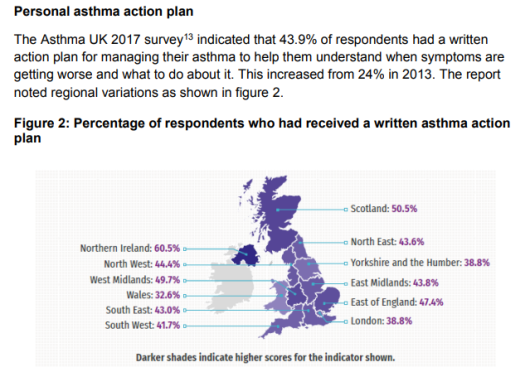
In the Observer today:
Lung disease patients waiting up to 10 years for diagnosis in poorer areas of England
Coincidently in the sister paper, the Guardian, in September 2023, we had this report on the same concerns. It seem little has happened in the years of Johnson, Truss and Sunak.
Today in the Guardian:
Overlooked lung conditions could create ‘deluge of hospital admissions this winter’ in England, with GPs unable to offer basic lung function testing, report findshttps://www.theguardian.com/society/2023/sep/26/thousands-with-breathing-problems-going-undiagnosed-due-to-lack-of-tests
When I read this, I was reminded of this in September 2019:

In Nursing Standard yesterday this horrific news:
Asthma patients are putting their lives at risk by skipping medication due to the cost, nurses have reported. The trend, revealed in an Asthma UK survey of 636 nurses in England, has prompted the RCN to call for prescription costs for asthma medication to be scrapped, as they have been for diabetes medication. In the survey, 58% of nurses said they had seen patients have an asthma attack or require emergency care as a result of not taking medication because they were unable to afford it.
Once more the contrast with Scotland is stark:


Asthma deaths are soaring in England and Wales but beginning to fall in Scotland. Clearly prescription costs will play a part but there seems to be another factor – a lack of basic checks in treatment plans including regular tests:

https://www.nice.org.uk/guidance/qs25/documents/briefing-paper
Scots asthma sufferers seem significantly more likely to have a treatment plan in place than those in England. The situation in Labour Wales is very bad with less than a third being treated properly.
Judging by the Guardian today, little has been done to improve the situation in England.

I wonder if the roll out of low emissions zones in the cities will have a positive effect on asthma sufferers? It seems to me it ought to, as it will for the rest of us.
However, the Scottish media continue to carp about them as part of the ‘war on the motorist’.
Alasdair Macdonald
LikeLiked by 2 people
I was at Primary school in the 1950s. Class size was never less than 45 throughout my time at primary school – immediate post-war baby boomers.. I can’t remember anyone being on an inhaler for asthma.
Fast forward to early 1980s my son went to Primary school. A small school. Intake in P1 when he started was 11 pupils. Half were on inhalers. The difference between 1950s & 1980s was the increase in traffic.
In the mid 1950s the Clean Air Act was brought in to address the issue of smogs/fogs caused by the use of coal – industrial and domestic. This, and subsequent Acts, made a huge difference but almost unnoticed was the increase in road traffic from the ’60s onwards. In the 1950s we could play peevers on the road in our Council scheme and rarely have to interrupt our game to let a car or lorry pass.
The pollution from increasing road traffic was pretty well ‘invisible’ but it was there and grew pretty well exponentially year on year. Studies showed the increase in childhood asthma and an obvious linkage so the experience of my son’s class was by no means a one off.
Therefore to me creating low emission zones is a no-brainer just as creating smokeless zones & clean air was a no-brainer to our parent’s generation.
LikeLike
“but almost unnoticed was the increase in road traffic from the ’60s onwards.”
No doubt an unforeseen consequence of the Beeching Report – which decimated the UK’s rail network. Something else we can blame the Tories for…
LikeLike
Not just the Tories. Harold Wilson in the 1964 election campaigned on stopping the Beeching cuts. He won the election, became PM and continued with the cuts.
Cuts to the railways may have resulted in an increase in road traffic but this would be partly offset when steam trains were replaced by diesel in 1965 although diesel has its own pollutants.
LikeLike